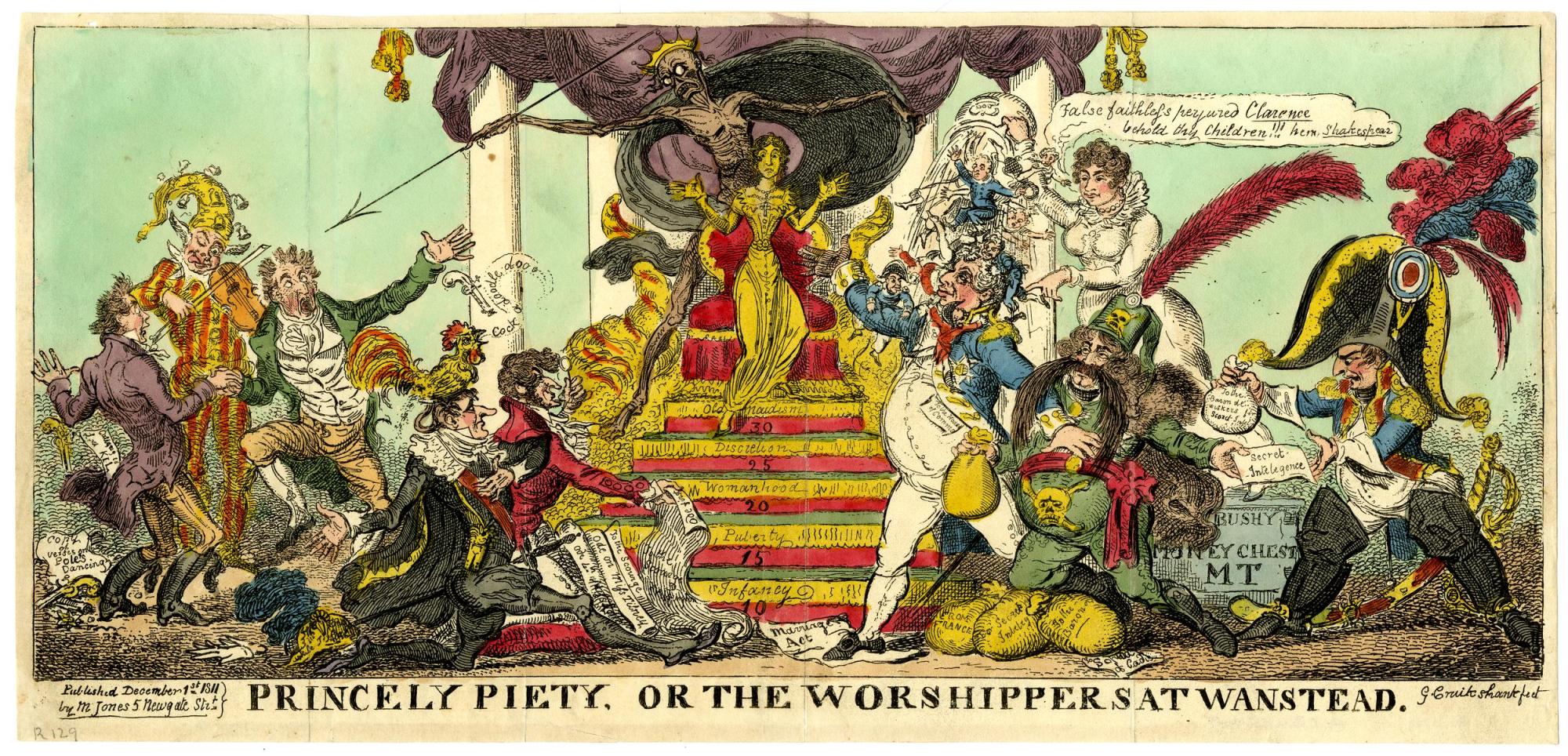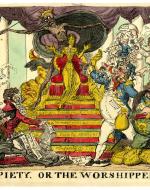Created by Laci Dezern on Thu, 10/03/2024 - 10:09
Description:
The etch created by George Cruikshank depicts Miss Tylney long, a young woman who was the sole heir to her fortune that would equal to around 30,000 pounds in the modern day. She is colored gold and is standing on a throne surrounded by suitors wanting her fortune. The inheritance law states that “daughters will not inherit their father’s estate” regardless of if she is an only child or only has sisters (Hall). It is for this reason that daughters must marry for status rather than for love.
Men have a similar conundrum that differs slightly depending on their birth order. If he is the eldest son, he is set to inherit his father’s estate. If he is not the eldest, he is required to either find a noble profession that will earn him wealth or find a wealthy bride to then use his wife’s dowry to push the couple into favorable prospects. Many of the younger sons joined the military to gain a sense of honor because they would only become favorable to a wealthy woman. “In Mansfield Park, Edmund Bertram becomes much more attractive to Mary Crawford when Thomas Bertram, the eldest son, is apparently on his deathbed” (Bailey). This is important in the military because this determines how decorative unofficial unforms could be.
In the navy specifically, though this could be applied to any militia uniform before the end of the Napoleonic wars, uniforms were not officially required and therefore could be decorated with gold strips and buttons. The pay was little, so “the need for prize money [taking enemy merchant ships] more acute, especially for men with families or men contemplating marriage” (Ford). Wealth was also a determining factor if men were able to move up the ranks or promote one another. Special Militias, such as “The Oxfordshire Regiment of Militia, like the other county militias, was essentially a private army” and therefore the Lord Lieutenant of the county was able to nominate officers and recommend promotions (Caplan). William Price in Mansfield Park was one of these officers to rise through the ranks. Henry, whose uncle was an admiral, was able to promote William so he may confess to Fanny. Many other men may have been doing the same during this time because they were not able to attain their father’s money to impress wealthy women.
Works Cited
Bailey, Martha. “The Marriage Law of Jane Austen’s World " Jasna.” Jane Austen Society of North America, jasna.org/publications-2/persuasions-online/vol36no1/bailey/. Accessed 8 Oct. 2024.
Caplan, Clive. Jane Austen’s Soldier Brother: - The Military Career Of, jasna.org/persuasions/printed/number18/caplan.pdf. Accessed 8 Oct. 2024.
Cruikshank, George, and M Jones. Princely piety, or the worshippers at Wanstead. 1 Dec. 1811.
Ford, Susan Allen. “Sailors in Fiction before Persuasion’s ‘Gentlemen of the Navy.’” Jane Austen Society of North America, jasna.org/publications-2/persuasions-online/volume-39-no-1/sailors-in-fiction-before-persuasions-gentlemen-of-the-navy/. Accessed 8 Oct. 2024.
Hall, Lynda. “Entail, Elopement, and Marriage Law in Pride and Prejudice.” Jane Austen Society of North America, jasna.org/publications-2/persuasions-online/volume-44-no-1/hall/. Accessed 8 Oct. 2024.
“Princely Piety, or the Worshippers at Wanstead, - Lassco - England’s Prime Resource for Architectural Antiques, Salvage Curiosities.” LASSCO, 23 Nov. 2022, www.lassco.co.uk/product/princely-piety-or-the-worshippers-at-wanstead/.
Copyright:
Associated Place(s)
Part of Group:
Featured in Exhibit:
Artist:
- George Cruikshank


